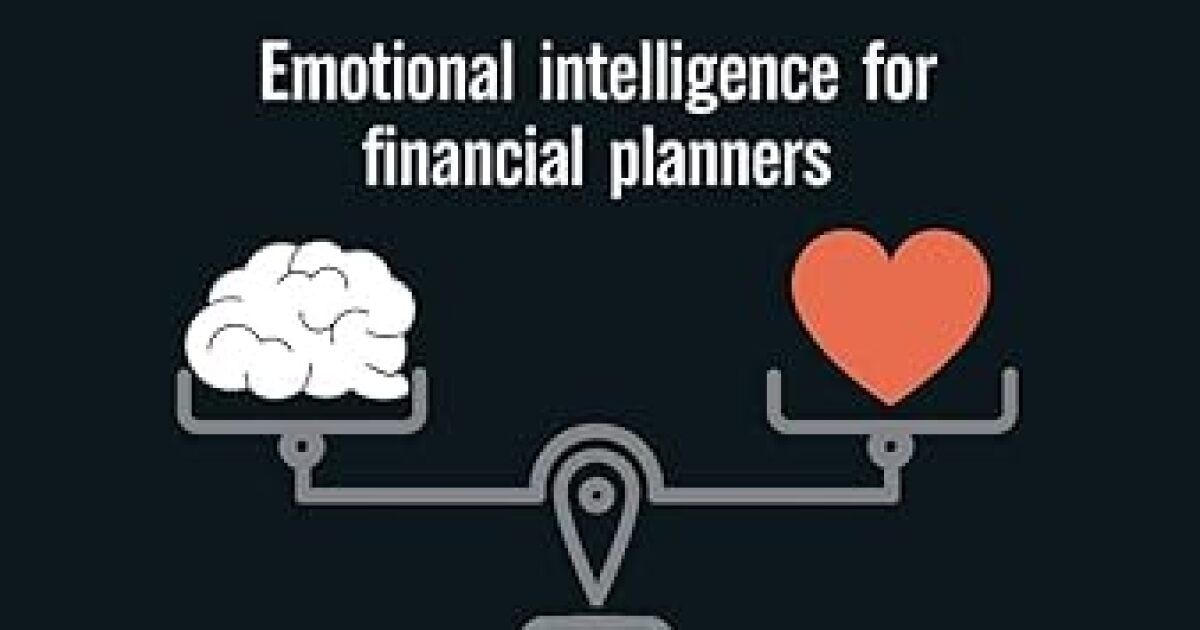- Global Financial Planning Software Market Size, Share
- 5 Ways To Prepare To Move Out of Your Parents’ House, According to Rachel Cruze
- How to use your Rising sign to plan your New Year Goals
- New TIFIN Give feature allows for public DAF campaigns
- 5 Expenses I Wish I Had Cut Sooner While Retirement Planning
Financial advisors ranging from new entrants to the profession to those whose experience often gives them an edge in emotional intelligence just got a concise new manual on the topic.
Bạn đang xem: New book guides financial advisors on emotional intelligence
“
READ MORE:
The field of planning clearly goes far beyond investment strategies and other technical skills. While
Elevate Communications
Out of the many areas of research and knowledge, emotional intelligence is “grounded in understanding and observing” people, and “teachable” through training that identifies the feelings underneath their behavior, Woodfall said in an interview. That’s because advisors “end up doing a lot of work
“It becomes deeply personal and meaningful for the person who’s sharing details about their life that they don’t share with their closest friend,” Woodfall said. “The thing that underpins that is people feeling comfortable opening up and sharing with you. And they wouldn’t do that if you were dismissing their emotional responses.”
Xem thêm : Five Questions With Rebecca Pavese
The book represents an effort “to deliver the specific training you need in order to succeed in the modern world, and to future-proof your role,” he and Lansley write in the introduction. The more that advisors “deliver an outstanding human experience alongside the advice you give,” the “more business your clients will do with you, the more they will recommend you to friends, family and colleagues, and the longer they will stay working with you,” they write.
“We also understand that advisers who invest in training and development act more ethically and navigate conflicts of interest better,” Woodfall and Lansley continue. “We are passionate about the excellent work that financial advisors do for their clients, yet the level of trust in the profession needs to reflect this. It may be the work of a few harmful agents that has eroded some trust in the profession, but with the tools and concepts in this book, we are optimistic that, as our message is shared, behaviors will start to change, and the level of trust will increase.”
Many successful advisors have already implemented aspects of emotional intelligence into their approach to client meetings and services, said Julie Genjac, an advisor coach who is the vice president of applied insights for asset management firm
“It’s being curious. I talk to teams a lot that will share with me examples of really knowing their clients, knowing their hobbies, knowing their families and how they ask those curiosity questions,” Genjac said. “It’s not just, ‘Oh, I hope you have a great fishing trip.’ It’s asking a little bit more. It’s almost educating yourself through your clients’ experiences.”
READ MORE:
Some of the best practices that Genjac has observed include meetings before and after speaking with the client to prepare the agenda and debrief from the sessions, ensuring that more than one team member is present during the conversation in order to get multiple viewpoints and role-playing exercises, she said. Outside of spouses or perhaps some other friends or family members, the clients “may not have anyone else in their life” to talk through some of the issues that they do with their planners, she added, echoing Woodfall’s point.
“They’re on a quest to process,” Genjac said. “If you can provide that moment of non-judgmental safe space for them, what a powerful resource that you can be just for listening.”
And that often runs counter to the standard training for solution-oriented advisors eager to turn the conversation toward portfolio management and the best investment alpha for clients, according to her and Woodfall.
Xem thêm : 57% of Consumers Received Financial Advice in 2023
“Instead, they want you to understand them, to reassure them when needed, to motivate them to act, to listen to them and counsel them if appropriate — and there is currently no mandatory training for these skills,” Woodfall and Lansley write. “You play an essential role in the critical moments in your clients’ lives, moments like marriage, death, divorce, loss of employment, retirement, starting a business, selling a business or moving home, among others.”

Elevate Communications
In the book, they lay out the importance of three different forms of empathy for clients’ situations and then proceed to explain how advisors can implement emotional intelligence. The eight chapters span
“You deal with the hopes and dreams of your clients and their families, their life savings or the business they have run all of their lives,” Woodfall and Lansley write. “You are therefore dealing with people’s hearts and minds. As their financial advisor, you will usually get to know what scares or excites them. These emotions aren’t always vocalized, especially by people who are more private, therefore seeing or hearing the subtle signs from their body language, their face or their voice can give you a huge advantage. Knowing how to read emotions and showing you understand your client will mean you can develop trust and rapport more easily. This will enable you to engage them in the financial planning process because they will notice that you know what is important to them.”
READ MORE:
For experienced planners, that approach may come more naturally because “one of the things that correlates with age is emotional intelligence, so emotional intelligence increases with age,” Woodfall said. They have been through more of the “highs and lows of life,” and “a lot of the experiences that we have in life resonate with clients,” he noted.
They still could gain some more knowledge about emotional intelligence from reading the book.
“It’s very easy to dismiss as maybe a bit too simplistic and go, ‘Oh I’ve heard that before,’ and skip it,” Woodfall said. “It might just be a handy reminder about what makes them successful.”
Nguồn: https://horizontalline.icu
Danh mục: News







